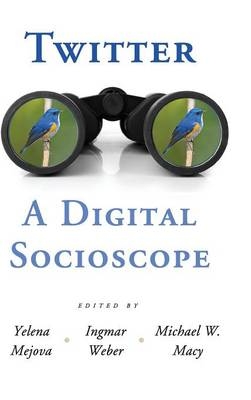
Twitter: A Digital Socioscope
Cambridge University Press (Verlag)
978-1-107-10237-8 (ISBN)
How can Twitter data be used to study individual-level human behavior and social interaction on a global scale? This book introduces readers to the methods, opportunities, and challenges of using Twitter data to analyze phenomena ranging from the number of people infected by the flu, to national elections, to tomorrow's stock prices. Each chapter, written by leading domain experts in clear and accessible language, takes the reader to the forefront of the newly emerging field of computational social science. An introductory chapter on Twitter data analysis provides an overview of key tools and skills, and gives pointers on how to get started, while the case studies demonstrate shortcomings, limitations, and pitfalls of Twitter data as well as its advantages. The book will be an excellent resource for social science students and researchers wanting to explore the use of online data.
Yelena Mejova is a scientist in the Social Computing Group at Qatar Computing Research Institute. Before QCRI, Yelena was a postdoc at Yahoo! Research in Barcelona. A part of the Web Mining Group, her work concerned building semantically enriched information retrieval systems, as well as examining user behavior through social media. Prior to that, her PhD thesis at the University of Iowa concerned the design and application of sentiment analysis tools for mining a variety of social media discourses, including political speech. Ingmar Weber is a senior scientist in the Social Computing group at Qatar Computing Research Institute. As an undergraduate he studied mathematics at the University of Cambridge, before moving to the Max Planck Institute for Computer Science, Germany, for his PhD. Before moving to Qatar, he spent two years working at the École Polytechnique Fédérale de Lausanne, Switzerland, and three years at Yahoo! Research in Barcelona, Spain. Michael Macy is Goldwin Smith Professor of Arts and Sciences and Director of the Social Dynamics Laboratory at Cornell University. His research team has used computational models, online experiments, and data from social media to explore enigmatic social patterns, the emergence and collapse of fads, the spread of self-destructive behaviors, cooperation in social dilemmas, the critical mass in collective action, the spread of contagion's on small world networks, the polarization of opinion, segregation of neighborhoods, and assimilation of minority cultures.
Introduction: opportunities and challenges for online social research Michael Macy and Scott Golder; 1. Analyzing Twitter data Shamanth Kumar, Fred Morstatter and Huan Liu; 2. Political opinion Daniel Gayo Avello; 3. Socio-economic indicators Huina Mao; 4. Hyperlocal happiness Daniele Quercia; 5. Public health Patty Kostkova; 6. Disaster monitoring Bella Robinson, Robert Power and Mark Cameron.
| Erscheint lt. Verlag | 5.5.2015 |
|---|---|
| Zusatzinfo | 4 Tables, unspecified; 7 Halftones, unspecified; 46 Line drawings, unspecified |
| Verlagsort | Cambridge |
| Sprache | englisch |
| Maße | 152 x 229 mm |
| Gewicht | 420 g |
| Themenwelt | Informatik ► Datenbanken ► Data Warehouse / Data Mining |
| Mathematik / Informatik ► Informatik ► Web / Internet | |
| ISBN-10 | 1-107-10237-5 / 1107102375 |
| ISBN-13 | 978-1-107-10237-8 / 9781107102378 |
| Zustand | Neuware |
| Informationen gemäß Produktsicherheitsverordnung (GPSR) | |
| Haben Sie eine Frage zum Produkt? |
aus dem Bereich


